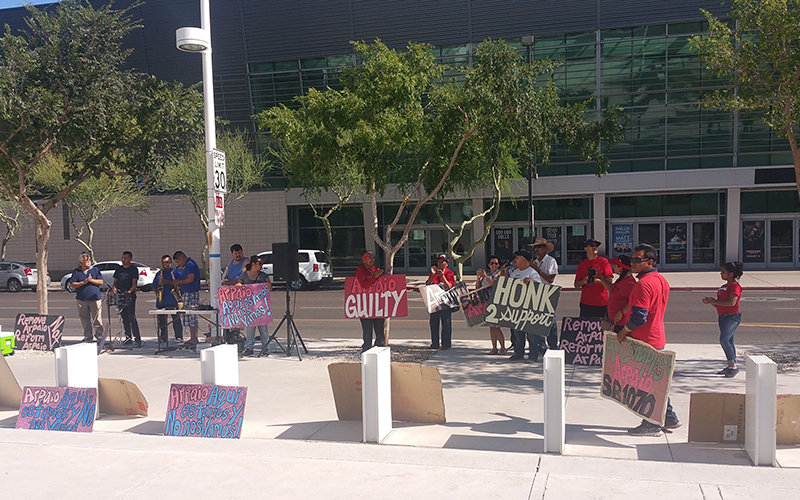
Protesters gather outside the Sandra Day O’Connor Courthouse before Sheriff Joe Arpaio’s contempt of court hearing. (Photo by Socorro Carrillo/Cronkite News)
PHOENIX – A federal judge who ruled Maricopa County Sheriff Joe Arpaio violated a court order to curb racial profiling decided Tuesday the county will have to pay at least $1,000 to each person unlawfully detained. But the judge delayed a decision on other penalties until June 30.
Defense attorneys and lawyers for plaintiffs presented dueling arguments during a daylong hearing before U.S. District Judge G. Murray Snow as Arpaio watched silently in court and Arpaio protesters carried signs outside the courthouse.
Protesters chant outside hearing for Sheriff Joe Arpaio. #az #sheriffjoe pic.twitter.com/RJltu83DJf
— Socorro Carrillo (@SocoCarr) May 31, 2016
After hearing arguments from both sides, Snow ruled that people who were unlawfully detained based on the suspicion they were in the country illegally, in violation of his court orders, would be paid $1,000 for the first hour they were held and $200 for every 20 minutes after that.
Snow stressed that he wants to give victims and residents of Maricopa County an “inexpensive but efficient” end.
Maricopa County lawyer Richard Walker argued that the county shouldn’t be liable for Arpaio’s intentional bad acts, according to azcentral.
Arpaio still faces possible criminal charges for being found in civil contempt of court by Snow on Friday.
Arpaio’s lawyers had offered to donate $100,000 to a civil rights group to avoid criminal charges. But Snow rejected it, saying that he did not believe that money obtained from the sheriff and friends would be enough to stop Arpaio’s continued misconduct.
Snow said the hearing will reconvene on June 30, after he hears briefings from attorneys. The judge still has to decide whether and how to penalize Arpaio and determine reforms to the sheriff’s internal investigations unit.
Tuesday’s hearing was another step in a drawn-out civil case, starting when Snow ordered an injunction in 2011 that Arpaio’s officers cease racial profiling measures. Snow determined sheriff’s officers wrongfully detained individuals well into 2013.
In court proceedings on Tuesday, lawyers for the American Civil Liberties Union, representing plaintiffs in the class-action suit, alleged that some cases of wrongful detainment also occurred in 2014.